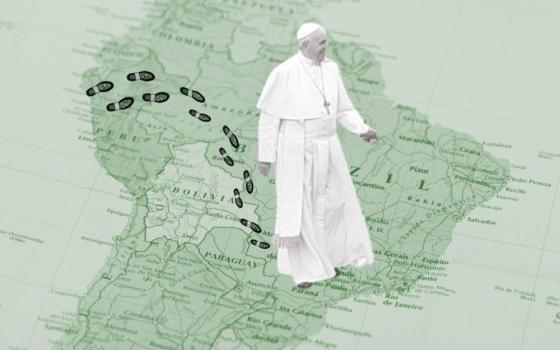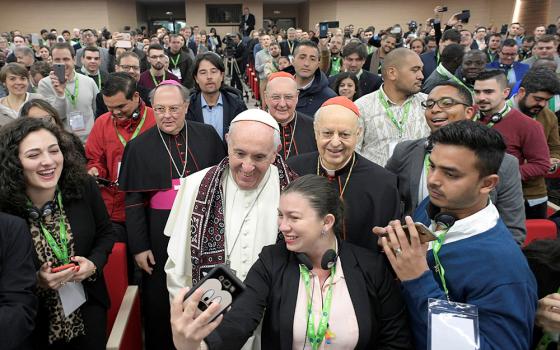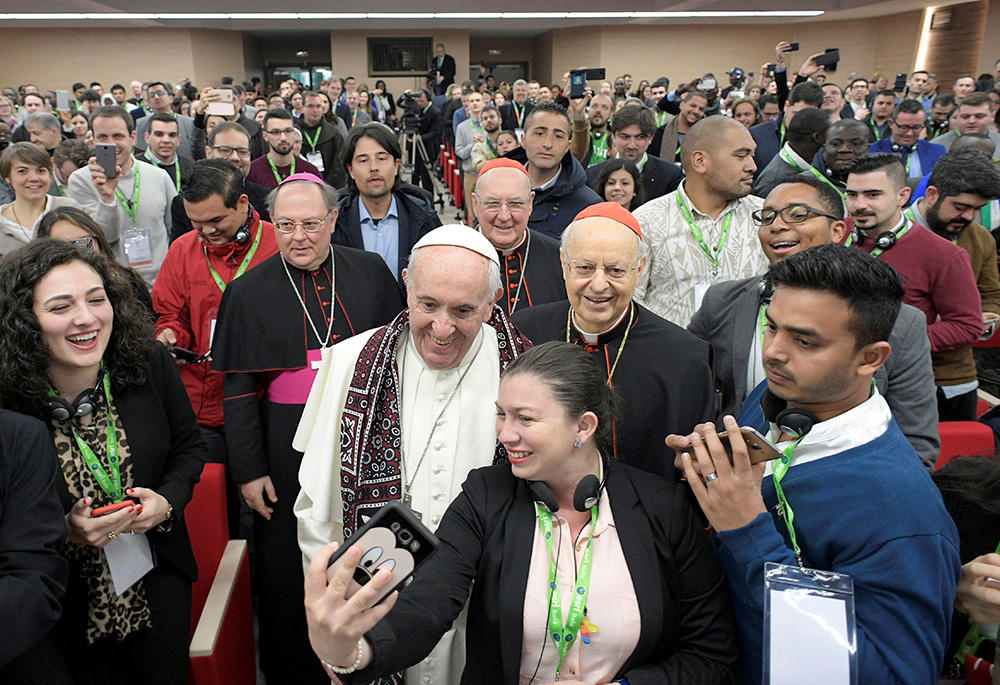
Pope Francis poses for a selfie during a pre-synod gathering of youth delegates, including NCR contributor Nicole M. Perone, far left, at the Pontifical International Maria Mater Ecclesiae College in Rome on March 19, 2018. The meeting was in preparation for the Synod of Bishops on young people, the faith and vocational discernment this October at the Vatican. (CNS/Vatican Media)
It is no surprise that Pope Francis loved being in the presence of young people; his face was never more illuminated and smile never so broad as when an engagement brought them together.
His grandfatherly affection for the young was demonstrated in his affirmation of the sanctity of their stage of life and concern for the challenges they face. However, his legacy moved beyond sheer kindness into concrete actions that made care for young adults a hallmark of his pontificate.
Francis' legacy of commitment to young people began in 2016, when the Synod of Bishops on young people, the faith, and vocational discernment was announced. It was the first synod to focus on young people, but that was not the only trailblazing quality: It was also the first time that young people were part of every step of a synodal process from start to finish, in the virtual realm and in person.
The process included a global survey to solicit the feedback of young people; a pre-synod gathering of young people in the heart of the Vatican, where Francis met with young adults directly to prepare the path forward; young adult delegates and observers in the synod hall; and a post-synod gathering of young adults. Feedback, testimonies and the desires expressed by young people at each stage, can be seen throughout the synodal process, including direct quotations in the final document.
Of course, that final document was perhaps the most significant outcome of that synodal process: Christus Vivit, the post-synodal apostolic exhortation, led to countless varieties of implementation in the global church at the parish, diocesan and organizational levels, as well as the creation of the international youth advisory body to advise the Dicastery for Laity, Family and Life. However, Francis took the synod's impact a step further, effectively using it as a case study to springboard into a more synodal path forward for the church.
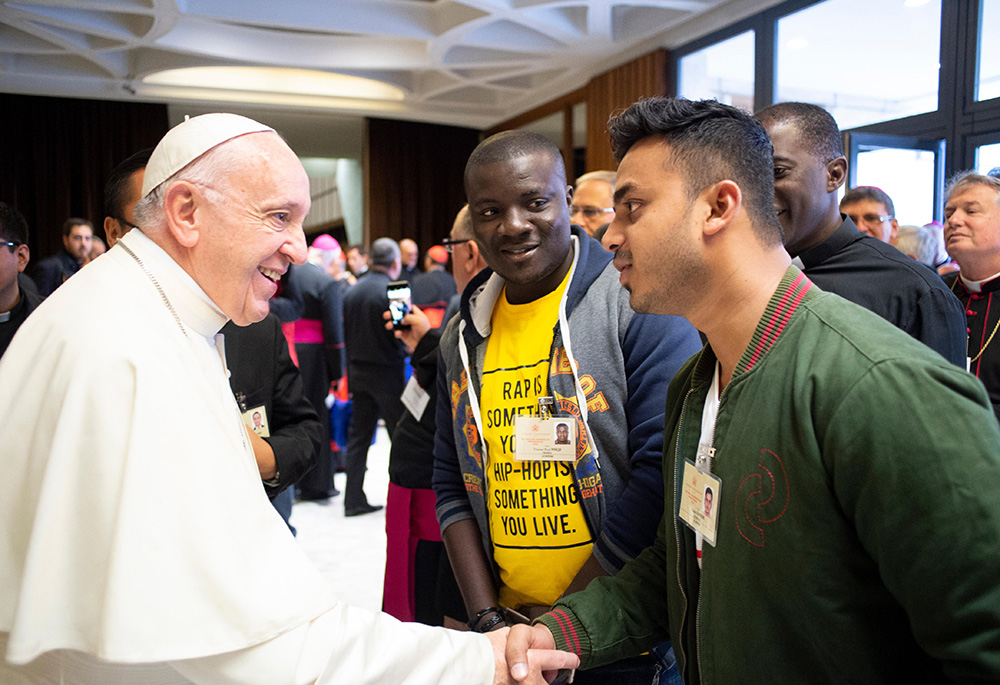
Pope Francis greets a youth delegate in 2018 before a session of the Synod of Bishops on young people, the faith and vocational discernment at the Vatican. (CNS/Vatican Media)
"I don't think the synod of synodality — and all that has changed because of that multi-year process and movement — would have happened in the way that it did, had it not been for the synod on young people," said Nick Stein, international director of Bon Secours Young Adults and chair of the board of directors of the National Institute for Ministry with Young Adults.
"It was the young people who challenged the prevailing structure and made their voices heard, who asked for the pope to take them seriously, that led to changes in the structure of the synod, that led to the inclusion of laypeople, that led to the round tables and real discussions," Stein said.
He also said he believes that "Francis knew that the energy and the hope that young people bring to the church was the path to showing the whole church that things can be done, and decisions can be made, with more inclusion, more diversity, and more honesty and integrity."
Bishop Frank Caggiano of Bridgeport, Connecticut, a founding member of the National Institute for Ministry with Young Adults and a delegate to the synod on young people, said, "When you take the synod on young people and added it to the emphasis on synodality, it has given rise to the voice of young people in the church in a way that they are taken more seriously and listened to."
He said the fact that young people were a priority, and had such a large role in drafting the synod document and that the pope spoke from the heart and spoke to young people directly as a pastor would, as a father would — all of that will have a lasting impact.
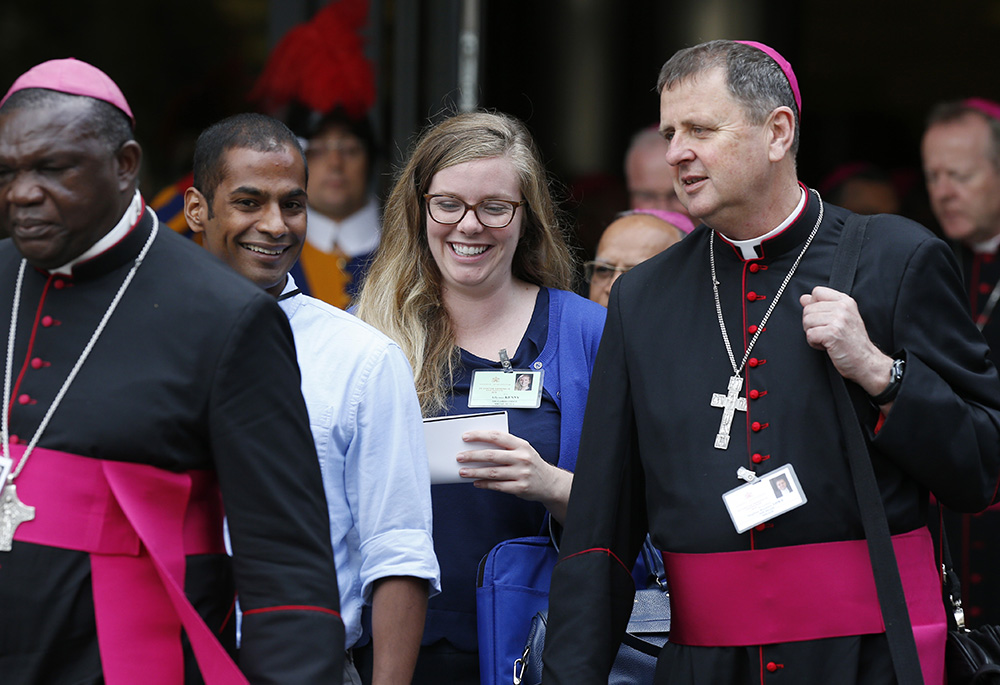
Bishops and youth delegates leave a session of the Synod of Bishops on young people, the faith and vocational discernment at the Vatican on Oct 5, 2018. (CNS/Paul Haring)
Paul Jarzembowski, associate director for the laity at the United States Conference of Catholic Bishops' Secretariat of Laity, Marriage, Family Life and Youth, affirmed the synod's local and global impact. "Christus Vivit is more than a papal reflection on a singular moment in the life of the church like the synod on young people. The way he wrote it allowed for it to become a foundational vision upon which the church can build a healthy approach to young adults. "
He said Christus Vivit will live on beyond Francis because the pope "centered the entire document around Jesus Christ … The USCCB framework [implementing Christus Vivit] will be our ministerial prototype for years to come in better engaging young people, and that is all due to the accompaniment model that Pope Francis encouraged."
Beyond a synodal process, beyond a document, Francis' closeness to young people and his movement of their voices from the margins to the center contribute to his vast legacy. "Thanks to Pope Francis, there has been a growth and development in the way in which the church approaches young adults," said Jarzembowski. "Rather than seeing them only as passive recipients of our ministry, the Holy Father has encouraged us to raise them up as protagonists of Christ's mission in the Church and in the world."
Darius Villalobos, senior project manager for diversity and inclusion for the National Federation for Catholic Youth Ministry and ex officio of the board of directors of the National Institute for Ministry with Young Adults, agreed.
"I think it already is impacting the ways we engage young people in the church, including the inclusion of young voices in the synods, in advisory bodies for bishops and pastors, in the way we do seminary formation, and how we see young people as protagonists and not the recipients of ministry efforts," he said.
Beyond a synodal process, beyond a document, Francis' closeness to young people and his movement of their voices from the margins to the center contribute to his vast legacy.
He also said he believed the church "can be transformed by having young people represented in so many places that they often were excluded from."
When pressed on the legacy Francis leaves on the church's young adults, words like "closeness," "mercy," "compassion," "belonging," and "listening" abound — as does the concept of centering young people.
As Jarzembowski stated, "Pope Francis will be remembered as a champion of the forgotten person, which is why so many young adults felt seen by him. Many young adults continue to feel forgotten: lost, isolated, alone and overwhelmed. No one wants to be left behind or dismissed. As much as possible, Pope Francis tried to make sure every young person was seen, appreciated and loved. … He modeled for the church a sense of pastoral concern, joyful attentiveness and optimistic hopefulness that we should have when relating to young adults."
Francis also invited young adults to the table of decision-making by listening to their joys and sorrows as well as their fears and hopes and committing to making choices that considered their realities and desires. Simply put: He tried to build a church worthy of the young people he believed in and loved.






